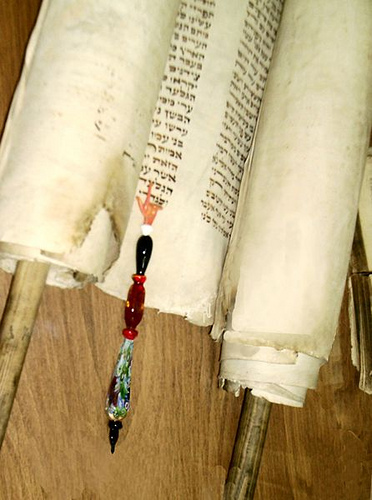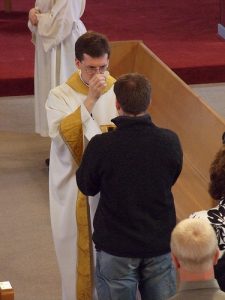Lectionary Reflection, 3rd Sunday after Epiphany
January 23, 2022*
The law of the Lord is perfect, reviving the soul; the decrees of the Lord are sure, making wise the simple; the precepts of the Lord are right, rejoicing the heart; the commandment of the Lord is clear, enlightening the eyes… — Psalm 19:7-8
Want to celebrate the power of scripture to enliven, instruct, and equip? The Revised Common Lectionary readings for this Sunday provide ample opportunity to lift up the centrality of Word to the life of the faithful. Preaching, teaching, and reading/studying scripture is central to all that we do in our worshiping communities. In fact, biblical literacy is an important part of faith formation. It’s pretty tough to share one’s faith without a working knowledge of the great narrative of God’s interaction with creation and humankind.
Consider the Old Testament lesson from Nehemiah. The third Sunday after Epiphany, Year C, is the only time a reading from Nehemiah appears in the Revised Common Lectionary. A sermon is probably not the best time to debate historical difficulties with the books Ezra and Nehemiah and the figures whose names they bear, but this beautiful passage of scripture is well worth unpacking in a sermon.
Can you imagine folks today listening to scripture being read for hours? And what about the emotional responses of those who hear the word of God read to them? After all the people had been through–the fall of the great nation, the captivity, and now the return–the words of YHWH bring them to their knees, their faces to the ground as they worship. The words of the law move them to tears, but Nehemiah and Ezra admonish them not to weep but to celebrate and share for “this day is holy to our LORD; and do not be grieved, for the joy of the LORD is your strength” (8:10b). What 21st century implications might this account have for our faith communities? How do law and gospel work in this context? What does this passage say to the importance of hearing scripture read aloud, internalized, and taken out into the world to share and celebrate?
Psalm 19 invites the community to celebrate God’s word through the lens of creation. This psalm also speaks to those whose call it is to preach both in terms of the sacred trust they have been given and of the richness of the words they are charged with proclaiming. This is poetry. This is song. This is metaphor. This is language at joyful, exuberant play. Best of all, we are invited to be engage in this play of word and reality. We are invited to speak, sing, and live it. How might you make this psalm more than the expected part it usually plays in worship?
The epistle lesson from First Corinthians provides an opportunity to reflect on what it means to live the radical call to Christian community and how vocation and stewardship of all life are inextricably woven into what it means to “be” the Body of Christ. I think that our challenge (and call!) as preachers and teachers is to lift Paul’s words to this particular congregation from mere history and from stale words on a seldom read page to the living, breathing experience of Spirit-filled life in the beloved community. Paul’s words definitely aren’t meant to define a mainline voluntary “membership-model” of Christianity. This is powerful stuff, a call to a renewed way of understanding and being church.
The gospel lesson from Luke also offers wonderful possibilities for Word and words. The setting is Jesus’ first worship leadership in his hometown following his return from the desert temptation. We’re told he is filled with the power of Holy Spirit. Jesus unrolls the scroll and reads the powerful words of prophecy from the 61st chapter of Isaiah–words that define his ministry and mission, words that foretell his coming, and words similar to those his mother sang while he was quickening in her womb. These are words we, too, can read and share to help people understand why we call ourselves followers of this Jesus. These are words that define how we live our lives as co-laborers ushering in the reign of God.
Sure, next week we will watch the people turn from hometown pride to outright rage at the words of Jesus, but for now let the power and promise of these words ring out. Today celebrate the power of Word and words. Feast on the word of God and taste and see that God is truly good. Proclaim the truth that we all have words to share and that we all have a part to play in this grand faith narrative and amazing body of Christ.
In Worship
Click here for a wonderful YouTube video presentation of “God of Wonders” performed by Third Day. The song was written by Steve Hindalong and Marc Byrd, members of the Christian Rock group The Choir. Click here for one with lyrics.
Here’s a lovely musical selection entitled “Psalm 19.” With its simple yet stunning visuals and meditative tune, it might make a good backdrop for a contrapuntal reading of this week’s psalm. Alternately, consider using it for a silent meditation following the reading/chanting of the psalm.
With Youth
Remember the party game Twister? If you have it in your youth room, play a game and then use that experience to talk about how the body of Christ is woven together–sometimes in wonderful ways, and sometimes in awkward or hilarious ways. Nonetheless, we belong to God and all of us have an important part to play in the church here on earth. Our strength as a body depends on the sum of our parts. Invite a conversation about how we can all work together in a way that glorifies God and presents a positive image of Christ’s body. Chances are your youth will have plenty to say about this–plenty worth listening to and sharing with other leaders in the community.
With Children
David’s prayer is our prayer, too! Remember the story of that youngster who trusted God enough to take on a giant using only a few smooth stones and a slingshot? David went on to be the King of Israel, known as a “man after God’s own heart.” Even though he made plenty of mistakes, he always returned to God and put his trust and very life into God’s hands. We can pray David’s prayer this day and every day. These are good words to remind us that words have power. We should always use them to God’s glory–for praising God and building others up, not tearing others down or taking God’s name in vain. In fact, we should strive by the help of the Holy Spirit to do and say everything to God’s honor and glory.
Give children a business-size or postcard size copy of David’s prayer from Psalm 19:14.
*This reflection was first published for the same RCL week in 2013.
Photos by Rachel-Esther, Robert Couse-Baker, and Susan WD . Thanks!






Leave a Reply